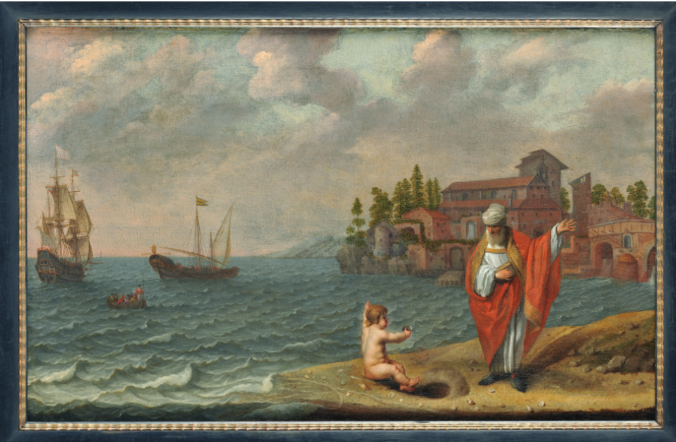Do you ever have weeks where you feel like you’ve taken two steps forward in faith and three steps backward? You wake up one morning and feel the voice of God so distinctly within your heart. You follow His gentle commands all day and fall asleep in peace that evening.
But then the next day you wake up worried about something you have no chance of controlling. You rush into the day, so caught up in this “thing” that you cannot stand still for even one minute, to wait for the Lord. Early in the afternoon, when you hear God whispering within your heart, you ignore Him because you think you’ve already found a solution and can go it alone.
Sound familiar? I spend a lot of weeks this way. And when I read the Book of Numbers in the Old Testament, I realize that I am not alone.
The Book of Numbers — and the first five books of the Old Testament overall — are a compelling read. The Book of Numbers starts with Moses taking a census of the people of Israel. Push through those initial chapters because the story soon picks back up with Israel’s journey to the Promised Land, following their escape from slavery in Egypt. With the help of God, Moses is leading the people through the desert and into the land of Canaan.
It’s a great story and a long journey — 40 years, to be precise. The Israelites experience highs and lows, as they struggle with learning to trust in God every day. It’s hard to imagine the spectacular displays of God’s power the Israelites witness as they make their journey. God physically parts the Red Sea, enabling their escape from the Egyptians who are pursuing them. (Exodus 14: 21-31) He appears to them in the form of a cloud each morning and a column of fire each evening. (Numbers 9: 15-23) Through Moses, God reveals the Ten Commandments. (Exodus 19 & 20)
And yet at times even Moses, God’s faithful and loving servant, stumbles and seems to lose his trust in God. How can this happen, when God is so close to Moses and His people?
God is equally near to us. Why are we afraid to believe what God promises?
The Book of Numbers reminds me that we are all wandering through our deserts of faith, on our way home to the Father. Our hearts and bodies are weak, which causes us to lose faith in God. We veer off course, which frustrates Him and us.
We know that God created us in His own image (Genesis 1: 26-27, 31), and we see His emotions on full display within the Book of Numbers, and frankly throughout the Bible. What I see most clearly through the Book of Numbers is the immense love and mercy of God, as He never tires in attempting to draw us back to Him.
I particularly treasure the story of the 70 elders (Numbers 11: 10-30). Moses is overwhelmed and exhausted with the responsibility of caring for this often difficult group of people. He cries out to God, asking for help. God instructs Moses to choose 70 men to become elders of the people; and He promises to fill these leaders with His Spirit so that they can help Moses to lead.
Moses does as he is told, but two of the men — one named Eldad and another named Medad — are not present in the tent with Moses and the others, when God’s Spirit descends upon them. Where were those two men, I wonder? What could they possibly have been doing that was more important than what was happening in that tent?!
And yet God still sends His Spirit to them, meeting Eldad and Medad where they are outside the tent. Amazingly, these men also begin to prophesy and lead. This causes a stir amond the other 68 elders who were inside the tent, but Moses quiets them by pointing out how much easier this journey would be if all of God’s people were prophets filled with the Spirit!
This brief story about Eldad and Medad is precious to me because it assures me of how much God loves us. Even when we are too busy to stop for Him, God comes looking for us, showering us with every goodness — and giving us another chance to be good, to do good, and to return to Him.
The Bible clearly shows us that there are repercussions for not listening to and following God’s commands for our lives. The decision to ignore God’s voice prevents us from experiencing His goodness right now, here on earth. Do we fully grasp this? Even Moses is ultimately denied entry into the Promised Land of Canaan because he disobeys God’s instruction for bringing water out of a rock. (Numbers 20: 1-13)
There are a series of moments in Moses’ life where his trust wavers, culminating in the incident at the rock. And yet we know that God loved Moses so deeply. As Moses nears death, God tells him to go up the mountain of the Abarim, Mount Nebo, which is in the land of Moab, opposite Jericho (Deuteronomy 32: 48-50), so that Moses can at least see the land of Canaan before He dies. God is with Moses, there on the mountain, when he dies. (Deuteronomy 34: 1-8)
God loves you deeply as well. He is there beside you now, as you wander through this day and life. He observes all of our hearts, on some level, searching for purpose and fulfillment. God knows that only His Purpose for our lives can bring us the joy and peace and love that we yearn for most deeply. (Proverbs 19:21)
God knows there will be times when we turn away from Him, for many different reasons. Help us to undertand and trust, Father, that we can always, always turn back to You.
Help us to know that you are always here, calling us back to You, and wanting nothing more than to love us.
“Come back to me, with all your heart; don’t let fear keep us apart.”1
1Gregory Norbet, “Hosea,” © 1972, 1980, The Benedictine Foundation of the State of Vermont, Inc. Here is a beautiful rendition of the song performed by Eliot Morris.




Recent Comments